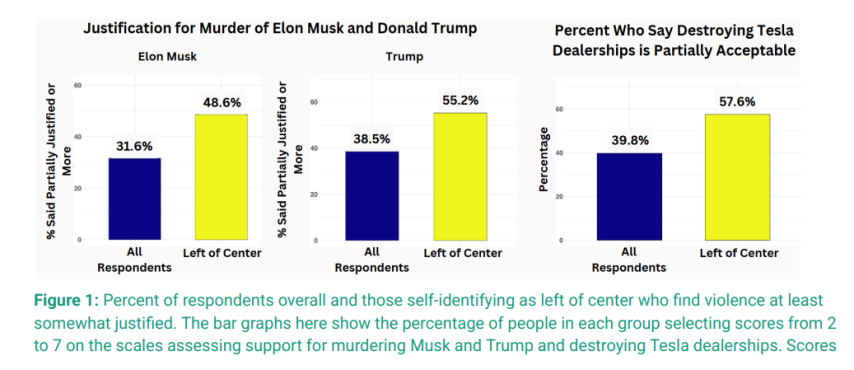Tolerance for political violence appears to have “surged” since the attempted assassination of President Donald Trump in Butler, Pennsylvania, last year, especially among “politically left-leaning” segments of the US population, a new report has warned.
The research, from the Network Contagion Research Institute (NCRI), found that political violence targeting Donald Trump and Elon Musk is becoming “increasingly normalized,” and that a broader “assassination culture” appears to be emerging within segments of the US public on the extreme left.
The report, titled Assassination Culture: How Burning Teslas and Killing Billionaires Became a Meme Aesthetic for Political Violence, is based on a survey of 1264 US residents, a cohort balanced to reflect census data on race/ethnicity, gender, age, and education.
Among the key findings were that 31 percent of respondents said that it would be at least somewhat justified to murder Elon Musk, while that figure rose to 38 percent when asked about President Trump.
The report’s authors note that these effects were largely driven by respondents that “self-identified as left of center”, with 48 percent and 55 percent at least somewhat justifying murder for Elon Musk and President Trump, respectively.
Respondents were asked to state their political ideology among the choices; Far Left, Liberal, Slightly Liberal, Middle of the Road, Slightly Conservative, Conservative, Far Right, No Affiliation and Something Else.
The NCRI defined “left of center” as those who chose “Far Left”, “Liberal”, and “Slightly Liberal”.

When it came to property destruction, such as the kind Musk’s Tesla brand is currently facing for his role in the Trump administration, almost 40 percent of respondents (39.8 percent) said that it is at least “somewhat acceptable” (or more) to destroy a Tesla dealership in protest as a form of protest. That figure rose to 57 percent for those who self-identified as “left of centre”.
The researchers found a psychological or ideological correlation with what they’ve termed “assassination culture,” describing these beliefs as “highly correlated” with one another, as well as with the justification of the murder of the UnitedHealthcare CEO Brian Thompson last December, and “hyper-partisan left-wing ideology”.
The social media platform ‘Bluesky’ was found to play a “significant and predictive” role in boosting radical expressions, with social media users calling for violence against political figures like Musk and Trump via memes and coded language, which the paper stated is a reflection of the “growing cyber-social presence of assassination culture”.
External ‘locus of control’ – the belief that external forces shape one’s outcomes in life – was found to be linked to greater support for violence, which the authors took as suggesting that “feelings of powerlessness may fuel justification for extreme action”.
The data overall revealed a “structured endorsement” of political violence targeting figures like Elon Musk and Donald Trump, the report reads, adding that far from being fringe views, they are reflective of “an emergent assassination culture grounded in far-left authoritarianism and increasingly normalized in digital discourse”:
“Cyber-social platforms—particularly BlueSky—play a strong predictive role in amplifying this culture. References to Luigi Mangione now function as coded endorsements of political violence, cloaked in irony, memeification, and plausible deniability. In these ecosystems, violence is not just justified—it is stylized, gamified, and embedded within a broader ideological narrative. Combined with psychological drivers such as external locus of control, these dynamics create a permissive environment in which users feel morally licensed to advocate or celebrate extreme acts.”
The NCRI predicted in conclusion that unless this trend is confronted by political and cultural leadership, “real-world escalation” will continue to become more likely.
“Given the current economic volatility and institutional distrust, the online normalization of political violence may increasingly translate into offline action.
“Taken together, the findings underscore the erosion of democratic norms and the growing acceptability of political violence in American discourse, particularly among ideologically extreme communities online. Continued monitoring and broader measurement efforts are urgently needed,” the report reads.
These findings build on a trend previously identified by the NCRI in December 2024, which released a set of papers that month analysing the role viral social media narratives had to play in legitimising political violence in the wake of Brian Thompson’s murder.
The reports, Praise for United Healthcare CEO Assassination Goes Viral and Killing with Applause: Emergent Permission Structures for Murder in the Digital Age, found broad justification for “lethal violence”, including assassination, among “younger, highly online, and ideologically left-aligned users”.